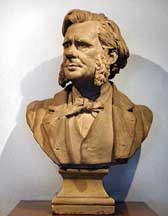Want to know how to navigate the Victorian Web? Click here.
 his
word, which has in the twentieth century come to signify little more than passive
disbelief, was invented by Thomas Henry Huxley at Cambridge in the
1860s. According to Charles Blinderman, Professor Emeritus at Clark University,
"The word seems to have been invented by him towards the end of the '60s, at
an early meeting of the Metaphysical Society. He did not use the term until
post-1870." Huxley, Darwin's great
advocate, coined the term, he says, because everyone else was an "-ist" of one
kind or another, and he had no label to apply to his own beliefs. He meant to
distinguish himself from those whose faith provided answers to the most profound
questions:
his
word, which has in the twentieth century come to signify little more than passive
disbelief, was invented by Thomas Henry Huxley at Cambridge in the
1860s. According to Charles Blinderman, Professor Emeritus at Clark University,
"The word seems to have been invented by him towards the end of the '60s, at
an early meeting of the Metaphysical Society. He did not use the term until
post-1870." Huxley, Darwin's great
advocate, coined the term, he says, because everyone else was an "-ist" of one
kind or another, and he had no label to apply to his own beliefs. He meant to
distinguish himself from those whose faith provided answers to the most profound
questions:
Does God exist? How can we know Him? (Why isn't He revealed more unambiguously in the scriptures?) Why would He create evil, and why would He allow the good to suffer and the wicked to flourish? Does He intervene miraculously in this world?

Thomas Henry Huxley. Portrait bust in Natural History Museum, London. Photograph by GPL.
He found that he could not answer those questions. Furthermore, he came to believe that no one could, without resorting to a knowledge (or gnosis) which goes beyond reason. Huxley, we must remember, was one of the first scientists to think of science as his profession; before the Victorian period, most scientific data was collected by vicars with time on their hands. As a professional scientist, Huxley insisted on reason and the empirical method as the only properly scientific way of knowing this world. For him faith meant believing what is literally incredible (i.e., unreasonable), and thus was impossible for a scientist. In dealing logically with the unknown, one may infer only phenomena like those he already understands. At first he believed that any faith involved bad logic (see Jean-Paul Sartre on "Bad Faith"), but later retreated from this position. Other agnostics (like Leslie Stephen, George Eliot, and W.K. Clifford) have been very willing to take up this position, however. Huxley always insisted that there was no such thing as organized Agnosticism, that as far as he was concerned the term described only his own beliefs. But to a large extent this child outgrew its parent.
The distinguishing characteristic of Victorian unbelief was the degree to which it became an alternative to traditional religion, and when men like Leslie Stephen and W.K. Clifford began calling themselves Agnostics, Agnosticism achieved the kind of success which Comte had tried to create for Positivism (which Huxley had dismissed as "Catholicism minus Christianity"). For the first time, men and women who could not accept the dogmas required by religions could avail themselves of a body of logical argument. By 1884, they even had their own journal, the Agnostic Annual.
Those who attacked Huxley and agnosticism tended to ignore the careful distinctions which he made, lumping agnostics in with atheists, materialists, and other "infidels." Taken in addition to the very traditional and conservative morals of the first Agnostics, who were careful to comport themselves like model middle-class Victorians, the distinctions are important to an explanation of the movement's influence. Where the atheist says that God does not exist, the agnostic says that reason can never be used to prove the existence of a being who transcends reason, and whether or not He exists, He does not intervene in human affairs, making speculation about His existence moot. We are on our own.
Twentieth-century thinkers, especially existentialists, have used agnosticism as a jumping-off point for their own philosophies, and the imprecision with which the term is used these days is a measure of its success. Much of that success is due to Huxley's creation of the name. "Agnosticism" has a cachet which neither "rational nonbelief" nor any other phrase could approximate.
References
Charles Blinderman, private letter, 1 July 2001. [In his letter Dr. Blindermin also points out that some "historians claim that Lady Burton used 'agosticism' before Huxley." Whether Huxley borrowed the term from her, or more likely independently coined it, his influence made the term current.]
Created 1987; last modified 1 July 2001